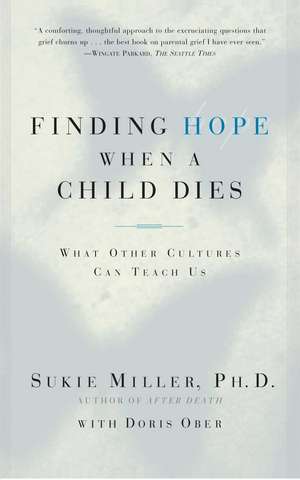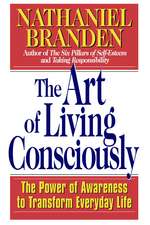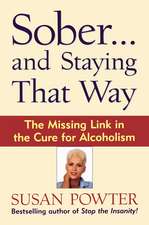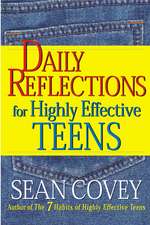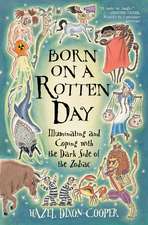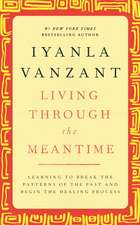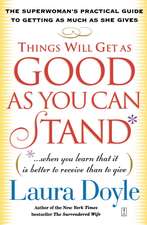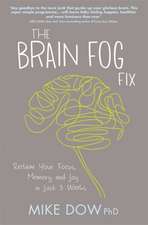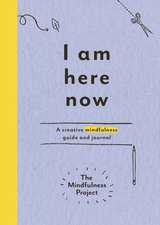Finding Hope When a Child Dies: What Other Cultures Can Teach Us
Autor Sukie Milleren Limba Engleză Paperback – 12 aug 2002
Preț: 104.79 lei
Nou
Puncte Express: 157
Preț estimativ în valută:
20.05€ • 20.94$ • 16.56£
20.05€ • 20.94$ • 16.56£
Carte disponibilă
Livrare economică 25 martie-08 aprilie
Preluare comenzi: 021 569.72.76
Specificații
ISBN-13: 9780684865614
ISBN-10: 0684865610
Pagini: 208
Dimensiuni: 140 x 216 x 13 mm
Greutate: 0.23 kg
Ediția:Reprint
Editura: Touchstone Publishing
Colecția Touchstone
ISBN-10: 0684865610
Pagini: 208
Dimensiuni: 140 x 216 x 13 mm
Greutate: 0.23 kg
Ediția:Reprint
Editura: Touchstone Publishing
Colecția Touchstone
Notă biografică
Sukie Miller, Ph.D., is a practicing psychotherapist and the founder and director of the Institute for the Study of the Afterdeath, as well as the pioneering Institute for the Study of Humanistic Medicine. She has served on the board of the Jung Institute of San Francisco and the Board of Medical Quality Assurance of the State of California. She lives in northern California.
Extras
Chapter One: We Have No Language
When your husband dies, you become a widow. When your wife dies, a widower. Children who lose their parents are called orphans. But we have no name for the parent who loses a child, nor for the brothers and sisters of a child who dies, nor for the others -- aunts, uncles, cousins, grandparents, even the friends, contemporaries, and adults -- who experience the loss of a child they love.
I hadn't realized the significance of there being no word for a child's survivors, and no word for the state of having lost a child, until I sat with those survivors over many years and began hearing the unpronounced fears that most people harbor for the children they love -- for these almost seem built in, whether we speak of them or not.
The fact that there is no name for the one who has lost a child is of enormous consequence: the nameless live in a kind of limbo. They still exist, but in a new stratosphere where their namelessness effectively isolates them from the rest of the world.
When we don't name things, they remain out of reach. I have never known a parent or anyone else who has lost a child not to describe a period of feeling completely out of touch, beyond the reach of anyone else's comfort or understanding. And it's true. You can't engage on any deep level with someone whose name you don't know. You can't effectively ask for something that you can't name: "Bring me that -- no that -- no that!" is unbearably inefficient.
More than 145,000 infants, children, teenagers, and young adults die every year in this country alone. At least as many families experience a miscarriage or stillbirth every year. So many people sharing a similar agony, and we have only the most halting language -- a few poor adjectives for what our culture considers the most tragic of personal experiences. They say we are bereaved, or that we are distraught or inconsolable. But this hardly approaches our emotional state and doesn't nearly describe who we have suddenly become when our child or brother or sister or friend dies. Because we are no longer who we were, and we never will be again.
Language Is How We Relate
Language is how we relate to one another and the world. However it is expressed -- spoken, or written, or sung; nonverbal, symbolic, even digital -- language is what allows us to express what we feel, who we are, what we know. It is that crucial link between what we're experiencing inside -- in the case of the death of a child, a unique combination of flashing turmoil that turns into grief that shifts to rage that becomes numbing despair -- and what's going on around us: other people's shock, other people's discomfort, other people's efforts to help, and the whole wide world that incredibly, astonishingly, continues to rotate on its axis and go on, business as usual, as if nothing out of the ordinary has happened at all.
Without language it is difficult to think, let alone empathize. And when we are dealing with the unthinkable to begin with and then have no words with which to approach it, no wonder that psychological wisdom says that the death of a child is the most difficult death for survivors to endure. No wonder recovery seems so impossible.
Without language those of us who want to help our grieving friends or family members or devastated clients are groping in the dark. We may have the best intentions, but what can we say? And what can they say to us? So many people want to help, need to be helped, and yet we remain isolated from each other because there is no language with which to connect.
This is the way it is when we have lost a child. Not only are we without the words to adequately express what we are feeling, but those others who love us don't know what to say to comfort us.
Those things about which we cannot speak or will not speak do not simply disappear because we don't discuss them. In fact, they gain some of their power over us because we don't have language to vent them. They remain crouching in the shadows of our lives, unpredictable, a locus of rage, of despair, of fear, looking for an opportunity to be heard.
You don't have to lose a child to know what I'm talking about. Everyone who has ever loved a child fears the death of that child. I have known mothers to hold a mirror under a sleeping child's nose to assure themselves he is still breathing, and we have all met new parents who, overwhelmed by their infant's fragility, were afraid to pick up their baby because they might hurt her or drop her or accidentally cause her death. Some parents are so frightened by the possibilities that the big world may hold for their children that they severely compromise the children's independence.
Those fears beset us when we are deciding the rules by which our daughters may stay out at night; those are the fears about the stranger in the playground. That's us, silently thinking the unthinkable.
A symptom of how unspeakable this subject is is reflected in the way we respond to the deaths of other people's children. We cannot talk about the possibility of our own children dying -- we can hardly bear to form such thoughts -- because it seems too much like tempting fate. But a child's death that is a step removed is mesmerizing. We follow the stories of children who die with a real need to understand what happened and why such a thing could happen. We're glued to our televisions when such tragedies make the news, and then we want to read about them in the next morning's paper. It is not morbid curiosity that drives us; it is a need to know, and everyone who has ever loved a child has it.
And it has always been this way. Just reciting the names of our dead children -- the Lindbergh baby, Adam Walsh, Megan Kanka, Polly Klaas, JonBenet Ramsey, Ennis Cosby -- evokes extreme emotions.
But we need words and sentences, as well as concepts, for when our children die. Without them we cannot console or be consoled. Without them healing is a forever affair.
Beginning to Speak About Death and Dying
In 1968, if we spoke about dying at all, it was in euphemisms. "She's not doing well" was about as explicit as we could be. We might bring ourselves to ask our doctor, "How much longer?" Everything was implied. And when people died, they "left us" or they "passed on." Because we were afraid or superstitious or embarrassed, we didn't speak about these things, and so we remained afraid, superstitious, and embarrassed about them.
This began to change in 1969 with the publication of an extraordinary book called On Death and Dying by Elisabeth Kubler-Ross. She became our first teacher in the language of life's last experience. And with the language we could finally begin to listen, begin to learn, begin to speak about such things.
Previously we thought about life and death as an on/off kind of thing. One was either active or inert, alive or dead. Dying meant simply that period just before death. We didn't often speak of anyone having a "good death"; we didn't distinguish ways of dying. We couldn't. We didn't have the language.
But Kubler-Ross told us that there are "stages" in the process of dying, and she named them: denial, anger, bargaining, depression, and acceptance. This sudden expansion of our language around a previously taboo subject flooded us with understanding.
By identifying and defining five specific stages in the dying process, Kubler-Ross provided us a vocabulary with which to begin to address, dissect, comfort, encourage, relate, empathize, and understand what was happening at the end of life.
Language, as I am using the word, is more than just a roster of words. It is also concepts and attendant practices. For example, at least once a year a banner is raised across the main street in the small town where I live that proclaims that it is Hospice Week. My town has an excellent hospital, and there is another fine hospital in a nearby town just thirty miles away. But we also have a hospice, a separate, acknowledged facility where we can go for help at the end of our lives, or from where medical and general care, counseling, housekeeping, and shopping help can be disbursed to our homes so that we may die in relative comfort, without great pain, still connected by virtue of proximity to those we love and who love us. During these caregiving-awareness days, many of the town's citizens and merchants have special fundraisers and sales to contribute in various ways to support our local hospice. This event is part of the new language developing around death and dying.
Before 1969 American communities had no social/medical structures dedicated specifically to the end of life. Today there are almost 3,000 hospices throughout the United States. Hospice, and everything it stands for, is both a result of and part of our new language and part of the ever-broadening discussion we have today on the subject of death and dying.
Since 1969 we have been adding to the language that Kubler-Ross began. Now we speak about near-death experiences, after-death experiences, and living wills. We discuss the "right to die" and debate the morality of "physician-assisted death." Today our "language" encompasses the psychology, the ethics, and the legalities that are part of dying. Today we can discuss openly what would have been considered "gory details" yesterday and avoided. We can talk about what we are dying of and precisely how we are dying of it. We can also talk about our grief around the subject of death as we never could before, expanding even more the language with which to address it.
Language is in every way an antidote to our fears and anxieties and general paralysis on the subject of death and dying. Language allows us to describe what happens, what is going through our minds, what we feel and have felt. Language lets us give sequence to events, render details and identifying marks. In all these ways we form definitions, and by doing so, we establish a common ground from which to speak.
With language what was amorphous takes shape. Whatever the subject, language brings it to life, and this is true even when the subject is death.
Once we find the common ground of language, we can develop treatment plans, erect facilities for the comfort of the dying, ratify laws that assist the dying, argue ethical standards regarding the treatment of the dying, seek comfort for the one who is dying, take comfort from others, and begin to heal. Without language we can do none of these.
With language not only can we name what we couldn't name before, but we may also be able to see what we couldn't see before. With language whole worlds open up to us. In some places that access may extend to the world where our deceased children reside.
Beginning to Speak About the Death of Children
When my first book was published, I was asked to do readings at bookstores and on radio shows across the country. The readings were intimate: thirty or forty people would come to meet me, listen to an excerpt from the book, and ask questions. I loved meeting my readers. The radio shows were the opposite of intimate, though I liked them too: they were wide open, disembodied. But as different as the radio stations were one from the other -- from Christian stations to liberal ones -- and as different as the bookstores were -- big chains or small independents -- what never varied was the call or question about a child who had died.
After the readings, when someone approached me or courageously raised a hand or called in to the radio station to ask specifically about a child who had died, I noticed that they almost always whispered.
"My baby died two months ago," one woman said softly at Readers' Books Store in Sonoma, California, and everyone in the room leaned forward in their seats to hear her better. "And I just wonder if there's something I could be doing for him now."
"My younger brother was killed in a drive-by [shooting]," one late-night radio caller in New York City reported. "I felt him with me all the time for three months after he died. I think he even talked to me. 'Hang in there,' you know. But now he doesn't talk to me. Have you ever heard of that?"
"Do you think I'll ever see my daughter again?" a father inquired by phone on an afternoon radio show in Texas on which I was a guest.
There was so much unsaid in those plaintive comments and questions, whether they were delivered in person or over the air. The grieving mother at Reader's Books could not expand on what she had asked about helping her child now. She feared looking foolish. She believed that no one could understand. Was she really asking if there is life after death? Did she even know what she meant?
The Language Exists in Other Cultures
There are many places all over the world where that mother not only would be understood but would receive a detailed answer to her question, "Can I help my child now?" In some cultures she would be assisted in asking her child directly what he needed. In other cultures her spiritual counselor, shaman, or priest could divine her child's needs and assist her in meeting them.
I have been to a shop in Singapore where cartons of utilitarian items for the dead were stacked floor to ceiling. In parts of India, elaborate rituals after the death of a child ensure the child's acceptance in the next life and a better life thereafter. In places in Africa where the afterworld is fraught with danger, parents make offerings to gods who will see to the safety of their children after death.
In many African, Indian, Asian, and Indonesian societies, to name just a sampling, a history of intimacy with child death provides a language with which to talk about it, understand it, and make provisions for it. In such places where the language exists, the man whose brother "talked" to him after death would discover how common a phenomenon this is, and the father who wondered about seeing his daughter again would be reassured by countless others -- perhaps the majority of people in the world.
In places where language encompasses concepts and beliefs, feelings and awareness, rituals, prayers, and other spiritual practices -- in addition to the narrower meaning of a lexicon of words -- thinking about, speaking about, understanding, and providing for such tragedies is how families and friends recover from them. It is not the same in our culture. What gets in our way? Why, when we have made fair progress concerning our deaths as adults, do we continue to whisper about the deaths of our children?
In the next chapters we'll take a look at some of the traditions and experiences that contribute to our limited language on this subject and our limited success in recovering from the loss of a child we love.
Copyright © 1999 by Sukie Miller, Ph.D.
When your husband dies, you become a widow. When your wife dies, a widower. Children who lose their parents are called orphans. But we have no name for the parent who loses a child, nor for the brothers and sisters of a child who dies, nor for the others -- aunts, uncles, cousins, grandparents, even the friends, contemporaries, and adults -- who experience the loss of a child they love.
I hadn't realized the significance of there being no word for a child's survivors, and no word for the state of having lost a child, until I sat with those survivors over many years and began hearing the unpronounced fears that most people harbor for the children they love -- for these almost seem built in, whether we speak of them or not.
The fact that there is no name for the one who has lost a child is of enormous consequence: the nameless live in a kind of limbo. They still exist, but in a new stratosphere where their namelessness effectively isolates them from the rest of the world.
When we don't name things, they remain out of reach. I have never known a parent or anyone else who has lost a child not to describe a period of feeling completely out of touch, beyond the reach of anyone else's comfort or understanding. And it's true. You can't engage on any deep level with someone whose name you don't know. You can't effectively ask for something that you can't name: "Bring me that -- no that -- no that!" is unbearably inefficient.
More than 145,000 infants, children, teenagers, and young adults die every year in this country alone. At least as many families experience a miscarriage or stillbirth every year. So many people sharing a similar agony, and we have only the most halting language -- a few poor adjectives for what our culture considers the most tragic of personal experiences. They say we are bereaved, or that we are distraught or inconsolable. But this hardly approaches our emotional state and doesn't nearly describe who we have suddenly become when our child or brother or sister or friend dies. Because we are no longer who we were, and we never will be again.
Language Is How We Relate
Language is how we relate to one another and the world. However it is expressed -- spoken, or written, or sung; nonverbal, symbolic, even digital -- language is what allows us to express what we feel, who we are, what we know. It is that crucial link between what we're experiencing inside -- in the case of the death of a child, a unique combination of flashing turmoil that turns into grief that shifts to rage that becomes numbing despair -- and what's going on around us: other people's shock, other people's discomfort, other people's efforts to help, and the whole wide world that incredibly, astonishingly, continues to rotate on its axis and go on, business as usual, as if nothing out of the ordinary has happened at all.
Without language it is difficult to think, let alone empathize. And when we are dealing with the unthinkable to begin with and then have no words with which to approach it, no wonder that psychological wisdom says that the death of a child is the most difficult death for survivors to endure. No wonder recovery seems so impossible.
Without language those of us who want to help our grieving friends or family members or devastated clients are groping in the dark. We may have the best intentions, but what can we say? And what can they say to us? So many people want to help, need to be helped, and yet we remain isolated from each other because there is no language with which to connect.
This is the way it is when we have lost a child. Not only are we without the words to adequately express what we are feeling, but those others who love us don't know what to say to comfort us.
Those things about which we cannot speak or will not speak do not simply disappear because we don't discuss them. In fact, they gain some of their power over us because we don't have language to vent them. They remain crouching in the shadows of our lives, unpredictable, a locus of rage, of despair, of fear, looking for an opportunity to be heard.
You don't have to lose a child to know what I'm talking about. Everyone who has ever loved a child fears the death of that child. I have known mothers to hold a mirror under a sleeping child's nose to assure themselves he is still breathing, and we have all met new parents who, overwhelmed by their infant's fragility, were afraid to pick up their baby because they might hurt her or drop her or accidentally cause her death. Some parents are so frightened by the possibilities that the big world may hold for their children that they severely compromise the children's independence.
Those fears beset us when we are deciding the rules by which our daughters may stay out at night; those are the fears about the stranger in the playground. That's us, silently thinking the unthinkable.
A symptom of how unspeakable this subject is is reflected in the way we respond to the deaths of other people's children. We cannot talk about the possibility of our own children dying -- we can hardly bear to form such thoughts -- because it seems too much like tempting fate. But a child's death that is a step removed is mesmerizing. We follow the stories of children who die with a real need to understand what happened and why such a thing could happen. We're glued to our televisions when such tragedies make the news, and then we want to read about them in the next morning's paper. It is not morbid curiosity that drives us; it is a need to know, and everyone who has ever loved a child has it.
And it has always been this way. Just reciting the names of our dead children -- the Lindbergh baby, Adam Walsh, Megan Kanka, Polly Klaas, JonBenet Ramsey, Ennis Cosby -- evokes extreme emotions.
But we need words and sentences, as well as concepts, for when our children die. Without them we cannot console or be consoled. Without them healing is a forever affair.
Beginning to Speak About Death and Dying
In 1968, if we spoke about dying at all, it was in euphemisms. "She's not doing well" was about as explicit as we could be. We might bring ourselves to ask our doctor, "How much longer?" Everything was implied. And when people died, they "left us" or they "passed on." Because we were afraid or superstitious or embarrassed, we didn't speak about these things, and so we remained afraid, superstitious, and embarrassed about them.
This began to change in 1969 with the publication of an extraordinary book called On Death and Dying by Elisabeth Kubler-Ross. She became our first teacher in the language of life's last experience. And with the language we could finally begin to listen, begin to learn, begin to speak about such things.
Previously we thought about life and death as an on/off kind of thing. One was either active or inert, alive or dead. Dying meant simply that period just before death. We didn't often speak of anyone having a "good death"; we didn't distinguish ways of dying. We couldn't. We didn't have the language.
But Kubler-Ross told us that there are "stages" in the process of dying, and she named them: denial, anger, bargaining, depression, and acceptance. This sudden expansion of our language around a previously taboo subject flooded us with understanding.
By identifying and defining five specific stages in the dying process, Kubler-Ross provided us a vocabulary with which to begin to address, dissect, comfort, encourage, relate, empathize, and understand what was happening at the end of life.
Language, as I am using the word, is more than just a roster of words. It is also concepts and attendant practices. For example, at least once a year a banner is raised across the main street in the small town where I live that proclaims that it is Hospice Week. My town has an excellent hospital, and there is another fine hospital in a nearby town just thirty miles away. But we also have a hospice, a separate, acknowledged facility where we can go for help at the end of our lives, or from where medical and general care, counseling, housekeeping, and shopping help can be disbursed to our homes so that we may die in relative comfort, without great pain, still connected by virtue of proximity to those we love and who love us. During these caregiving-awareness days, many of the town's citizens and merchants have special fundraisers and sales to contribute in various ways to support our local hospice. This event is part of the new language developing around death and dying.
Before 1969 American communities had no social/medical structures dedicated specifically to the end of life. Today there are almost 3,000 hospices throughout the United States. Hospice, and everything it stands for, is both a result of and part of our new language and part of the ever-broadening discussion we have today on the subject of death and dying.
Since 1969 we have been adding to the language that Kubler-Ross began. Now we speak about near-death experiences, after-death experiences, and living wills. We discuss the "right to die" and debate the morality of "physician-assisted death." Today our "language" encompasses the psychology, the ethics, and the legalities that are part of dying. Today we can discuss openly what would have been considered "gory details" yesterday and avoided. We can talk about what we are dying of and precisely how we are dying of it. We can also talk about our grief around the subject of death as we never could before, expanding even more the language with which to address it.
Language is in every way an antidote to our fears and anxieties and general paralysis on the subject of death and dying. Language allows us to describe what happens, what is going through our minds, what we feel and have felt. Language lets us give sequence to events, render details and identifying marks. In all these ways we form definitions, and by doing so, we establish a common ground from which to speak.
With language what was amorphous takes shape. Whatever the subject, language brings it to life, and this is true even when the subject is death.
Once we find the common ground of language, we can develop treatment plans, erect facilities for the comfort of the dying, ratify laws that assist the dying, argue ethical standards regarding the treatment of the dying, seek comfort for the one who is dying, take comfort from others, and begin to heal. Without language we can do none of these.
With language not only can we name what we couldn't name before, but we may also be able to see what we couldn't see before. With language whole worlds open up to us. In some places that access may extend to the world where our deceased children reside.
Beginning to Speak About the Death of Children
When my first book was published, I was asked to do readings at bookstores and on radio shows across the country. The readings were intimate: thirty or forty people would come to meet me, listen to an excerpt from the book, and ask questions. I loved meeting my readers. The radio shows were the opposite of intimate, though I liked them too: they were wide open, disembodied. But as different as the radio stations were one from the other -- from Christian stations to liberal ones -- and as different as the bookstores were -- big chains or small independents -- what never varied was the call or question about a child who had died.
After the readings, when someone approached me or courageously raised a hand or called in to the radio station to ask specifically about a child who had died, I noticed that they almost always whispered.
"My baby died two months ago," one woman said softly at Readers' Books Store in Sonoma, California, and everyone in the room leaned forward in their seats to hear her better. "And I just wonder if there's something I could be doing for him now."
"My younger brother was killed in a drive-by [shooting]," one late-night radio caller in New York City reported. "I felt him with me all the time for three months after he died. I think he even talked to me. 'Hang in there,' you know. But now he doesn't talk to me. Have you ever heard of that?"
"Do you think I'll ever see my daughter again?" a father inquired by phone on an afternoon radio show in Texas on which I was a guest.
There was so much unsaid in those plaintive comments and questions, whether they were delivered in person or over the air. The grieving mother at Reader's Books could not expand on what she had asked about helping her child now. She feared looking foolish. She believed that no one could understand. Was she really asking if there is life after death? Did she even know what she meant?
The Language Exists in Other Cultures
There are many places all over the world where that mother not only would be understood but would receive a detailed answer to her question, "Can I help my child now?" In some cultures she would be assisted in asking her child directly what he needed. In other cultures her spiritual counselor, shaman, or priest could divine her child's needs and assist her in meeting them.
I have been to a shop in Singapore where cartons of utilitarian items for the dead were stacked floor to ceiling. In parts of India, elaborate rituals after the death of a child ensure the child's acceptance in the next life and a better life thereafter. In places in Africa where the afterworld is fraught with danger, parents make offerings to gods who will see to the safety of their children after death.
In many African, Indian, Asian, and Indonesian societies, to name just a sampling, a history of intimacy with child death provides a language with which to talk about it, understand it, and make provisions for it. In such places where the language exists, the man whose brother "talked" to him after death would discover how common a phenomenon this is, and the father who wondered about seeing his daughter again would be reassured by countless others -- perhaps the majority of people in the world.
In places where language encompasses concepts and beliefs, feelings and awareness, rituals, prayers, and other spiritual practices -- in addition to the narrower meaning of a lexicon of words -- thinking about, speaking about, understanding, and providing for such tragedies is how families and friends recover from them. It is not the same in our culture. What gets in our way? Why, when we have made fair progress concerning our deaths as adults, do we continue to whisper about the deaths of our children?
In the next chapters we'll take a look at some of the traditions and experiences that contribute to our limited language on this subject and our limited success in recovering from the loss of a child we love.
Copyright © 1999 by Sukie Miller, Ph.D.
Cuprins
CONTENTS
Acknowledgments
Introduction: Questions When a Child Dies
PART ONE
1. We Have No Language
2. Our Mirror of God
3. The Seventh Guilt
4. Freezing in Time
PART TWO
Introduction to Part Two: Answers When a Child Dies
5. Why Did My Child Die?
Destiny and the Seventh Guilt
6. Where Is My Child Now? Will I Ever See Him Again?
Life After Death, a Counterforce to Freezing in Time
7. Are the Unborn Real?
Death before Life, Expanding the Language after Death
8. Can I Help My Child Where She's Gone?
Helping Rituals, Reasserting Our Power
9. Can My Child Hear Me?
Calling the Children
PART THREE
Introduction to Part Three: Language When a Child Dies
10. The Other Side of Our Mirror of God
11. Initiation
12. Life As an Initiate
Appendix A: Self-Help Resources
Appendix B: About the Senior Researchers for the Institute for the Study of the Afterdeath
Appendix C: About the Institute for the Study of the Afterdeath
Endnotes
Bibliography
Index
Recenzii
Wingate Parkard The Seattle Times A comforting, thoughtful approach to the excruciating questions that grief churns up...the best book on parental grief I have ever seen.
Rachel Naomi Remen, M.D. author of Kitchen Table Wisdom Dr. Miller has written a book that will revolutionize our thinking and restore our hearts.
Howard K. Bell, M.Div. executive director of Pathways, a health crisis resource center, Minneapolis, Minnesota Impactful, spiritual, and enlightening. Sukie Miller's personal wisdom, clinical insights, engaging storytelling abilities, and findings from her innovative research are powerfully integrated.
Rachel Naomi Remen, M.D. author of Kitchen Table Wisdom Dr. Miller has written a book that will revolutionize our thinking and restore our hearts.
Howard K. Bell, M.Div. executive director of Pathways, a health crisis resource center, Minneapolis, Minnesota Impactful, spiritual, and enlightening. Sukie Miller's personal wisdom, clinical insights, engaging storytelling abilities, and findings from her innovative research are powerfully integrated.
